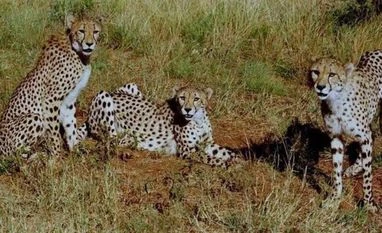The Centre on Friday constituted a high-level steering committee of national and international experts to oversee and monitor its ambitious Project Cheetah.
The decision was taken after six of the newly translocated cheetahs, including three newborn cubs, died within two and half months at Kuno National Park in Madhya Pradesh.
The Cheetah Project Steering Committee was set up by the National Tiger Conservation Authority (NTCA), which is the nodal agency for the reintroduction plan. The panel will review, monitor and advise the Madhya Pradesh forest department and NTCA.
The 11-member committee will be headed by Rajesh Gopal, secretary general of Global Tiger Forum. A panel of international cheetah experts has also been formed for consultation.
The government notice did not mention if the experts will look into the deaths.
“The committee, tasked to review the progress of cheetahs brought from Namibia and South Africa, will be in force for a period of two years and will hold at least one meeting every month, besides taking field visits as and when required,” the NTCA said in a notification issued hours after two more cubs of Namibian cheetah Jwala died on Thursday.
Also Read
On March 27, adult female Namibian cheetah Sasha succumbed to renal infections, while on April 23, a male South African cheetah Uday died due to cardiopulmonary failure. Sixteen days later, South African female cheetah Daksha died of mating injuries. The first cub died on May 23. Two days later, two more cubs died.
Four cheetah cubs were born in India to the wild cats that were reintroduced in the country after seven decades. The cheetah cubs born to the Namibian cheetah died of dehydration and malnourishment, according to a MP forest department statement on May 25.
“A team, which was continuously monitoring Namibian female Siyaya/Jwala (which was on supplement food during day time) and three surviving cubs, found that the condition of the three cubs wasn't normal. The three cubs were rescued and put under dedicated treatment of vets, but despite all efforts two of the three surviving cubs couldn’t be saved,” added the statement.
The only surviving cub is being treated by vets in consultation with Namibian and South African experts. Its mother is said to be healthy, but being monitored.
The cheetah count at Kuno now stands at 18. Out of 17 adults, seven are Namibians and 10 South African.
)